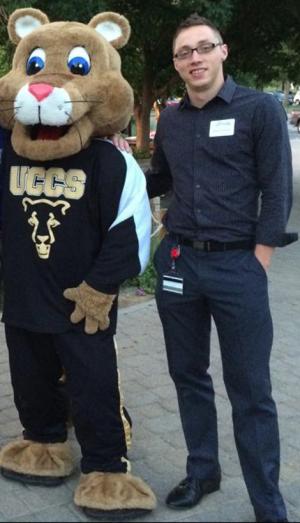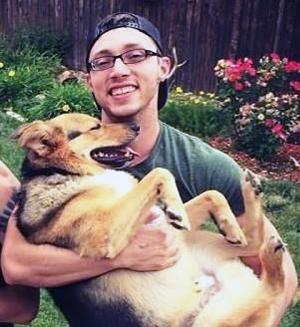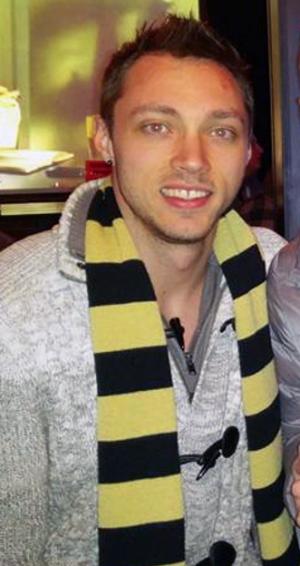Five questions for Ryan Untisz
As a recruiter for the university, Ryan Untisz had to learn about CU and the programs it offers to attract the best talent for staff and classified positions. This role provides him with a keen insight that enables him to advocate for those same employees as vice chair of the CU Denver l Anschutz Staff Council and as chair of the University of Colorado Staff Council (UCSC).
Untisz joined human resources at CU Denver and CU Anschutz in 2014; in 2016, he accepted a role at the CU Anschutz College of Nursing, where he said he worked with “incredible faculty and staff” for two years.
“As I was finishing up grad school, I decided to return to a recruitment and talent acquisition role, so I came back to campus HR, working at the Lawrence Street Center downtown,” he said. “I get to talk a lot about the great things CU is doing in order to attract great candidates and encourage people to apply to our open positions.”
Outside of work, he spends time with his brother, nephew, partner, and his family to recharge his batteries. He learned to snowboard six years ago, and now the sport is his favorite winter activity. In the warmer months, he heads to some favorite hiking trails, such as Chautauqua in Boulder and Devil’s Thumb near Eldora, and he plans to tackle some 14ers. He also is a DJ and has played in venues in Denver, Puerto Vallarta, Mexico, San Francisco and Nevada.
1. How long have you been involved with both the Denver l Anschutz Staff Council and the University of Colorado Staff Council? What prompted you to get involved?
I started with the campus staff council in the beginning of 2017, and so am now in the third year of my first three-year term. I don’t think I had any specific activity that I wanted to engage in; I wanted to do more for CU beyond my day-to-day work. I wanted to take on something extra and support the campus and the institution in a new way.
During my first year on the campus council, I was placed on the Policy and Legislation Committee. It was great to dig in a little bit on how the campus and the institution structured policy at all levels and determine where staff council had the ability to chime in and make our voices heard on certain levels of policy and where we could represent the voices of staff more broadly.
This is my first year with UCSC. Initially, I was filling a vacancy, but when we got into the final portion of the CU president search, I was asked to be more involved in the interview process where UCSC representatives were able to spend time interviewing Mark Kennedy. During that time, I was able to work closely with my predecessor, Nancy Moore, and other members of staff council and was nominated by one of my colleagues to run for chair and I agreed. And here I am.
One reason I accepted the nomination was because we started to do some incredible things at the campus level. I used this as an opportunity to shift my focus to do potentially great things for staff across all four campuses and bring to the council some of my human resources perspective, which gives you a global view of what some of the organizational challenges are in an institution like CU, and use that to balance those challenges with the needs of staff.
2. What are your goals as chair of UCSC for both the organization and your constituents?
I was lucky to come into a group of highly engaged and thoughtful staff members who really care about staff and the university. For council, I want to bring in some potential efficiencies in technology and new processes. We’ve asked for administrative help, which is something Faculty Council has, because what we do is volunteer work and having additional help with administrative tasks will lighten the burden for council members.
I also want to improve how UCSC interacts with the campus councils. It sometimes feels as if each group works on its own. The campus councils have built relationships with their chancellor, their provost and campus leadership team. Certain areas, like the tuition benefit and pay equity, might require more of a systemwide push and I’m looking to UCSC to try to move the needle a little bit more than the individual campuses have been able to.
We want to continue to work toward improvements in the tuition benefit. At our retreat in August, we also started a conversation about improving the way staff is represented on presidential vacancy search committees in the wake of the Mark Kennedy search. It left staff feeling a bit underrepresented or disenfranchised. In the presidential search, staff submits a list of potential representatives and the Board of Regents can choose a representative from the list or pick someone else that staff did not recommend. We want to be able to choose the person who will best represent staff concerns.
Another goal is to collect some information about retention among staff at CU and use that to make recommendations to administration on ways to better retain staff. We want to figure out what the turnover looks like and why staff are leaving.
3. Council has been working toward equity for staff in a variety of areas for many years. How will you work to achieve some of your objectives?
I think there is an appetite across all levels and at all campuses to make progress in equity among staff, and even between staff and faculty where it makes sense. My predecessor, Nancy Moore, did a wonderful job building partnerships and getting these topics front-of-mind for many in leadership at CU. I am looking forward to continuing our partnership with Faculty Council to engage in joint advocacy in areas that impact both faculty and staff. Equity in the tuition benefit, and total compensation and pay fit into that category. We also want to hear from staff and constituents from all four campuses, because often some of the best ideas start with information that gets shared with us.
One of the approaches I’m trying with tuition benefit is to work with leadership to find some solutions, even if that means we have to look at a trade-off, for instance giving up an underutilized benefit to make improvements to the tuition benefit. I’m looking at a more diplomatic approach, rather than passing resolutions detailing what is broken.
4. What would you consider some of your best achievements in your work with governance organizations or the university?
In my second year on the CU Denver l Anschutz Staff Council, we invited every candidate running for the Board of Regents to speak to community members on both campuses. This was a highlight of my time on the council because I got to see just what impact council could have. The committee I chaired was able to set up two events where candidates came to share their thoughts with constituents that weren’t necessarily in their voting districts. The candidates wanted to hear from people they aspired to lead and learn about the challenges facing faculty, staff and students. For those who weren’t able to attend, we recorded the events and put them on the web so they could watch later.
5. Are you involved with other university entities?
I’m a CU Denver alumni, and as of this year, I am a CU Advocate. I joined because I think it is important to people to advocate at the grassroots level for policies that advance higher education and change the narrative around what higher education is doing in our state. Our elected officials and community members can benefit from hearing from CU Advocates about what we’re doing and what we’re doing well.




